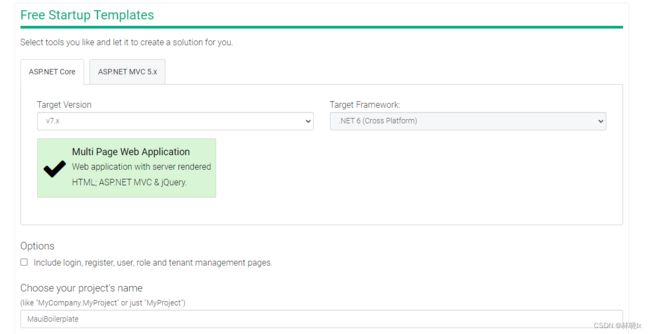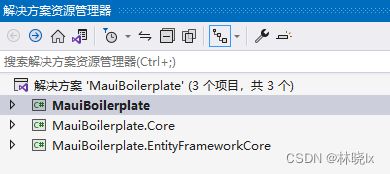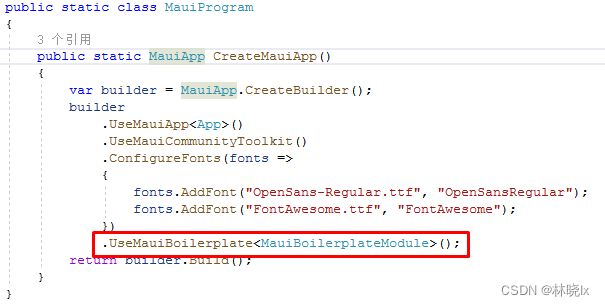将Abp移植进.NET MAUI项目(一):搭建项目
前言
写在.NET MAUI官宣正式发布之际,热烈庆祝MAUI正式发布!
去年12月份做了MAUI混合开发框架的调研,想起来文章里给自己挖了个坑,要教大家如何把Abp移植进Maui项目,由于篇幅限制,将分为三个章节。
将Abp移植进.NET MAUI项目(一):搭建项目_林晓lx的博客-CSDN博客
将Abp移植进.NET MAUI项目(二):配置与基类编写_林晓lx的博客-CSDN博客
将Abp移植进.NET MAUI项目(三):构建UI层_林晓lx的博客-CSDN博客
熟悉Abp的同学都知道,Abp 是一套强大的应用程序设计时框架(俗称脚手架),新版本的Abp vNext为微服务和网络优化的更多,然而本地开发经典Abp已经够用,而且官方没有停止维护,因此使用这个框架
MAUI则是跨平台的应用程序抽象层,强大的运行时框架 + 强大的设计时框架 , 我说这是宇宙最强大跨平台开发框架,不为过吧?
计划:
- 整个程序我们还是利用Mvvm设计模式,但是将利用Abp的Ioc容器,而不使用mvvmlight或者xamarinToolkit这些库,自行编写一个ViewModelBase
- 使用Abp.EntityFrameworkCore库中的EF相关功能,使用sqlite作为数据持久化方案。
目标:编写一个歌单App,对歌曲信息进行增、删、查、改。
下面来看看如何搭建
搭建MAUI项目
请注意:本文发布时,MAUI处于RC3版本,仍没有正式发布,需要安装Visual Studio 2022 17.3 (Preview)
首先按照官方教程搭建一个MAUI项目, 命名为MauiBoilerplateBuild your first .NET MAUI app - .NET MAUI | Microsoft Docs
再前往Abp官网生成一个项目
Startup Templates - Create a Demo | AspNet Boilerplate
- 选择最新版本 v7.x 和.Net 6版本
- 取消勾选“Include login, register, user, role and tenant management pages”
- 项目名称中填入MauiBoilerplate与Maui项目保持一致
点击“Create My Project”生成abp项目文件,等待下载完成
下载,解压好后,打开src目录可以发现4个项目目录,我们仅需要Core和EntityFrameworkCore项目,将这两个目录移至项目根目录,并且添加至解决方案。
配置应用入口点
在MauiBoilerplate.Core项目中
改写默认配置文件
{
"ConnectionStrings": {
"Default": "Data Source=file:{0};"
},
"Logging": {
"IncludeScopes": false,
"LogLevel": {
"Default": "Debug",
"System": "Information",
"Microsoft": "Information"
}
}
}
在MauiBoilerplate.Core.csproj中的ItemGroup节点下添加
Always
在MauiBoilerplate.Core项目中新建MauiBoilerplateBuilderExtensions.cs 作为程序入口
添加一个静态方法InitConfig,用于读取项目的配置文件appsettings.json,若第一次运行或者该文件不存在则读取默认的配置文件
private static void InitConfig(string logCfgName, string documentsPath)
{
var assembly = IntrospectionExtensions.GetTypeInfo(typeof(MauiBoilerplateBuilderExtensions)).Assembly;
Stream stream = assembly.GetManifestResourceStream($"MauiBoilerplate.Core.{logCfgName}");
string text = "";
using (var reader = new System.IO.StreamReader(stream))
{
text = reader.ReadToEnd();
}
if (DirFileHelper.IsExistFile(documentsPath))
{
var currentFileContent = DirFileHelper.ReadFile(documentsPath);
var isSameContent = currentFileContent.ToMd5() == text.ToMd5();
if (isSameContent)
{
return;
}
DirFileHelper.CreateFile(documentsPath, text);
}
else
{
DirFileHelper.CreateFile(documentsPath, text);
}
}
添加一个静态方法InitDataBase用于初始化sqlite数据库文件"mato.db"
private static void InitDataBase(string dbName, string documentsPath)
{
var assembly = IntrospectionExtensions.GetTypeInfo(typeof(MauiBoilerplateBuilderExtensions)).Assembly;
Stream stream = assembly.GetManifestResourceStream($"MauiBoilerplate.Core.{dbName}");
StreamHelper.WriteStream(stream, documentsPath);
var path = Path.GetDirectoryName(documentsPath);
DirFileHelper.CreateDir(path);
}添加一个 静态方法UseMauiBoilerplate用于初始化配置文件,初始化db文件和向管道服务中注册AbpBootstrapper实例。
public static MauiAppBuilder UseMauiBoilerplate(this MauiAppBuilder builder) where TStartupModule : AbpModule
{
var logCfgName = "log4net.config";
var appCfgName = "appsettings.json";
var dbName = "mato.db";
string documentsPath = Path.Combine(Environment.GetFolderPath(Environment.SpecialFolder.LocalApplicationData), MauiBoilerplateConsts.LocalizationSourceName, logCfgName);
string documentsPath2 = Path.Combine(Environment.GetFolderPath(Environment.SpecialFolder.LocalApplicationData), MauiBoilerplateConsts.LocalizationSourceName, appCfgName);
string dbPath = Path.Combine(Environment.GetFolderPath(Environment.SpecialFolder.LocalApplicationData), MauiBoilerplateConsts.LocalizationSourceName, dbName);
InitConfig(logCfgName, documentsPath);
InitConfig(appCfgName, documentsPath2);
InitDataBase(dbName, dbPath);
var _bootstrapper = AbpBootstrapper.Create(options =>
{
options.IocManager = new IocManager();
});
_bootstrapper.IocManager.IocContainer.AddFacility(f => f.UseAbpLog4Net().WithConfig(documentsPath));
builder.Services.AddSingleton(_bootstrapper);
WindsorRegistrationHelper.CreateServiceProvider(_bootstrapper.IocManager.IocContainer, builder.Services);
return builder;
}
在MauiBoilerplate项目中
新建MauiBoilerplateModule.cs ,并编写代码如下,这是App起始模块
[DependsOn(typeof(MauiBoilerplateEntityFrameworkCoreModule))]
public class MauiBoilerplateModule : AbpModule
{
public override void Initialize()
{
IocManager.RegisterAssemblyByConvention(typeof(MauiBoilerplateModule).GetAssembly());
}
}打开MauiProgram.cs文件,将UseMauiBoilerplate添加到MauiAppBuilder
这里提一下, MAUI 应用跟其他.Net6应用一样采用泛型主机启动应用,在项目中有一个静态MauiProgram类,这是应用的入口点。 这提供了从单个位置配置应用、服务和第三方库的功能。
更多泛型主机的信息,请参阅微软文档.NET 通用主机 | Microsoft Docs
至此,在主机管道中已经配置了MauiBoilerplate服务
配置Abp
App.xaml是应用的声明起始点,将从这里初始化Abp
打开App.xaml.cs,添加如下代码:
public partial class App : Application
{
private readonly AbpBootstrapper _abpBootstrapper;
public App(AbpBootstrapper abpBootstrapper)
{
_abpBootstrapper = abpBootstrapper;
InitializeComponent();
_abpBootstrapper.Initialize();
this.MainPage = abpBootstrapper.IocManager.Resolve(typeof(MainPage)) as MainPage;
}
}注意,我们还没有创建初始页面MainPage,你可以先创建这个文件,将在第三章讲UI层时介绍
至此,就完成了MAUI项目的搭建与Abp脚手架的集成,现在你可以在这个项目中使用Abp的IocManager,ConfigurationManager,工作单元特性,模组化特性,等等任何的Abp提供的功能了。
但是距离目标:制作一个具有数据访问层的App,还需要两段路要走:配置数据库,以及编写界面。
请看下一章将Abp移植进.NET MAUI项目(二):配置与基类编写_林晓lx的博客-CSDN博客
项目地址
jevonsflash/maui-abp-sample (github.com)



